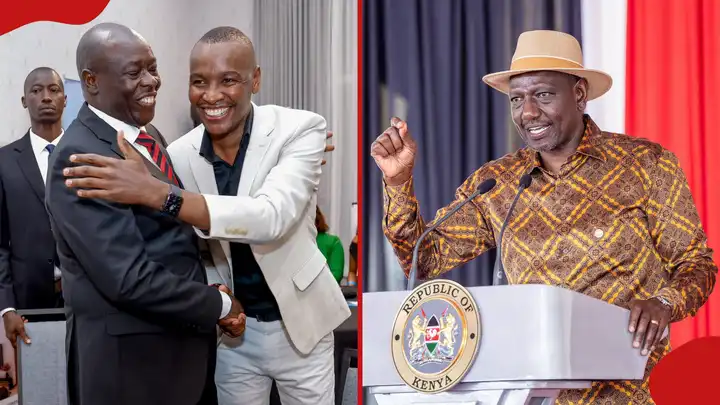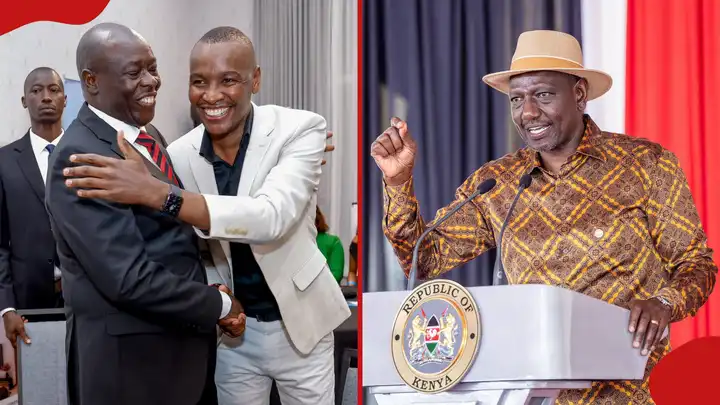
In Kenya's vibrant entertainment scene, few names carry the weight and charisma of Samidoh, the Mugithi sensation known for blending rich Kikuyu cultural tunes with modern flair. But in recent weeks, the conversation surrounding the singer has shifted from his melodic storytelling to a more controversial note—one that intertwines music, politics, and a newfound boldness.
During a recent live performance, Samidoh sparked a storm of reactions after seemingly aiming sharp criticism at President William Ruto and his administration. While the jab was delivered with humor and wrapped in the familiar rhythm of a popular Kikuyu tune, the message was clear: the singer had something to say about the current political climate—and he wasn't holding back.
A New Chapter After Police Service
The performance came just days after it was confirmed that Samidoh had officially resigned from the National Police Service, where he had served for several years. His departure, while not entirely unexpected, marked a significant turning point in his career and public life. It also seemed to mark the moment he stopped tiptoeing around political discourse and began using his platform to speak more freely.
As a serving police officer, Samidoh had to balance the delicate line between duty and personal freedom of expression. He had previously landed in hot water for allegedly participating in or encouraging anti-government chants during performances, a move that put him at odds with the rules governing officers in uniform. Now, unshackled from those restrictions, the singer appears to be embracing his role not just as an entertainer, but as a voice of the people.
The Power of “Wantam!”
What truly caught the attention of many during this particular performance was Samidoh’s use of the chant “Wantam!”—a term loaded with political weight. Originating from former Deputy President Rigathi Gachagua, who has since broken ranks with President Ruto and become one of his most vocal critics, "Wantam" is shorthand for “one term.” It suggests that Ruto’s presidency will not extend beyond a single term in office and that he’ll be ousted in the 2027 elections.
Samidoh cleverly wove this slogan into the lyrics of his performance, transforming a cultural song into a political statement. For many in the crowd—and those watching online—it was a moment of artistic rebellion, couched in the familiar tones of folk music but aimed squarely at those in power.
A Country Reacts
As expected in today’s digital age, the performance was captured on video and quickly made its rounds on social media platforms. Within hours, the online space was flooded with mixed reactions. Some Kenyans applauded the singer for his courage, viewing his message as a much-needed voice in a country where economic hardship and political disillusionment are on the rise.
“I admire Samidoh for speaking out,” one user wrote on X (formerly Twitter). “Artists have a role in holding leaders accountable. He’s saying what many of us are thinking.”
But not everyone was impressed. Critics accused the singer of using his fame irresponsibly, especially in such a politically charged environment. Others felt that entertainers should avoid diving into divisive political commentary, especially when the country is already dealing with rising tensions.
“This isn’t the time for careless remarks that can stir unrest,” another user commented. “He should stick to singing, not politics.”
Art as Activism
Throughout history, music has often played a powerful role in political discourse—from the protest songs of Bob Marley and Fela Kuti to the anti-apartheid anthems of South Africa. In that tradition, Samidoh’s performance can be seen as part of a broader legacy where artists use their craft to reflect the struggles, frustrations, and hopes of the people.
What makes Samidoh’s case particularly compelling is that he straddles two worlds: the disciplined, hierarchical world of law enforcement, and the free-spirited, expressive realm of music and art. Having now fully stepped into the latter, his willingness to speak out—even indirectly—against the political status quo signals a growing trend among Kenyan artists who no longer want to remain silent in the face of social and political challenges.
The Road Ahead
Whether Samidoh intended his performance as a political provocation or simply a moment of artistic expression is up for debate. What’s certain is that it has sparked a national conversation—one that touches on the role of artists in political discourse, the freedom of expression in a polarized society, and the power of music to challenge authority.
As Kenya inches closer to the 2027 general elections, figures like Samidoh may continue to influence public opinion in ways politicians can't. His recent act wasn't just a song—it was a signal. A message that the people are watching, listening, and, in some cases, singing along.
Love him or hate him, Samidoh has made one thing clear: he’s not just playing the guitar anymore—he’s striking a chord with the conscience of the nation.
Samidoh has left netizens in puzzle over his new song which he had lately composed after resigning as police officer.
Source: https://www.facebook.com/100067867727102/posts/1114826580789589/?mibextid=rS40aB7S9Ucbxw6v


Comments (0)